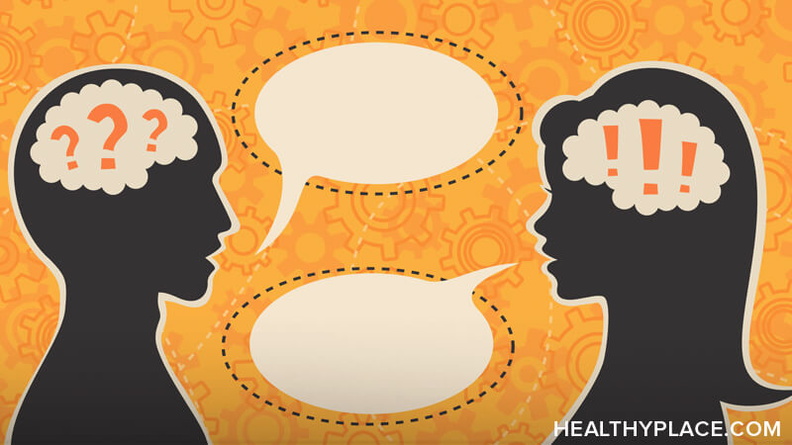Talking About Verbal Abuse

Talking about verbal abuse isn't easy. Have you ever brought up the issue of verbal abuse in a conversation and instantly been met with an eye roll, groan, or grimace? If the answer is yes, you're not alone. People don't generally like to talk about verbal abuse and even less, be accused of verbal abuse, especially if you're using the words "verbal abuse." In this modern age of politically correct and technical language and the aversion that comes with it, how do we begin talking about verbal abuse, a rampant issue that affects nearly everyone at one point in their lives?
Talking About Verbal Abuse Is Important Because It's Everywhere
Learning and talking about verbal abuse is important. Whether as a kid at home with your parents, an adolescent navigating high school with bullies and mean girls, a lovesick romantic stuck in a bad relationship, or an adult merely trying to make a living at his nine-to-five, verbal abuse is everywhere. Identifying the qualifying behaviors as such seems to carry with it a stigma though, a common disdain for the term. For some reason, it seems to carry a much heavier weight when you call someone out for being "verbally abusive" rather than just using more specific language like name-calling or controlling, aggressive, blaming, and shaming language (Verbal Abuse Signs and Symptoms).
There's a severity that comes with using words like "abuse" and "abusive" that can trigger a defensive and denial mechanism in almost anyone. When you really think about it, verbal abuse can be simply broken down as really bad communication skills. What's more normal and common than communication issues? Movies, television, books, social media, and Cosmopolitan and New York Times articles survive and thrive on topics involving some kind of communication issues. The current political era might even be partially defined by it: the inability to effectively communicate with an opposing force.
We Must Learn About Verbal Abuse on Our Own
Most men and women do not enter into adulthood well equipped with a communication toolbox, filled with techniques for consistently staying rational and productive, that helps their relationships maintain a healthy status. Many people grow up harboring resentment for the way they were treated once or even repeatedly and translate that into behaving badly themselves. It can be a never-ending cycle if unacknowledged and not nipped in the bud.
My point is that verbal abuse is not an uncommon problem for people involved in all kinds of relationships, spanning all age groups. Verbal abuse is serious business and this article does not serve to minimize it but to normalize it in a way where it can be destigmatized and addressed without gasps and denial so we can recognize abusive behavior in ourselves and our relationships and make an effort to do better ourselves and demand better for ourselves.
Destigmatizing a topic like verbal abuse in a time where tweets that read "F your Feelings" and "Snowflake," are trending, is admittedly optimistic but still a valiant effort. Not only is it valiant, it is self-serving; everyone will get something good out of normalizing a topic that impacts the vast majority. Bring this topic out of the shadows by being okay with admitting, "I'm a name-caller," or "my partner is hyper-critical and we need to work on this."
Communicating is hard because it is not always logical, it's emotional. Emotions bring out the best and worst in all of us. It's time to destigmatize talking about something that impacts people everywhere.
Ways to Destigmatize Verbal Abuse
- Identify and acknowledge your own ways of poorly communicating with the people in your life. Read about the signs and symptoms of verbal abuse and connect it with behavior patterns you may exhibit in your relationships (7 Signs You Are Verbally Abusive).
- Listen with open ears and an open mind when someone brings up the issue of verbal abuse to you. Try not to dismiss topics that make you feel uncomfortable.
- Recognize verbal abuse as a mental health issue and seek therapy for serious communication issues that are impacting your quality of life.
- Educate yourself on the signs, symptoms, and consequences of verbal abuse. Read and share useful information. Don't shy away from starting discussions on the topic.
- Acknowledging verbal abuse doesn't impact just a small percentage of the population but has likely touched the lives of everyone you know at one point or another.
As humans we are flawed and imperfect, that's part of our journey, embracing that is the best path to self-awareness and an improved quality of life. Stop being scared of labels like victim or abuser and start a conversation. To gain further insight into the complex, yet common, issue of verbal abuse, utilize all of the resources HealthyPlace has to offer. Keep reading, keep sharing, and keep talking about verbal abuse.
APA Reference
Sullivan, E.
(2018, July 3). Talking About Verbal Abuse, HealthyPlace. Retrieved
on 2025, November 12 from https://www.healthyplace.com/blogs/verbalabuseinrelationships/2018/7/talking-about-verbal-abuse